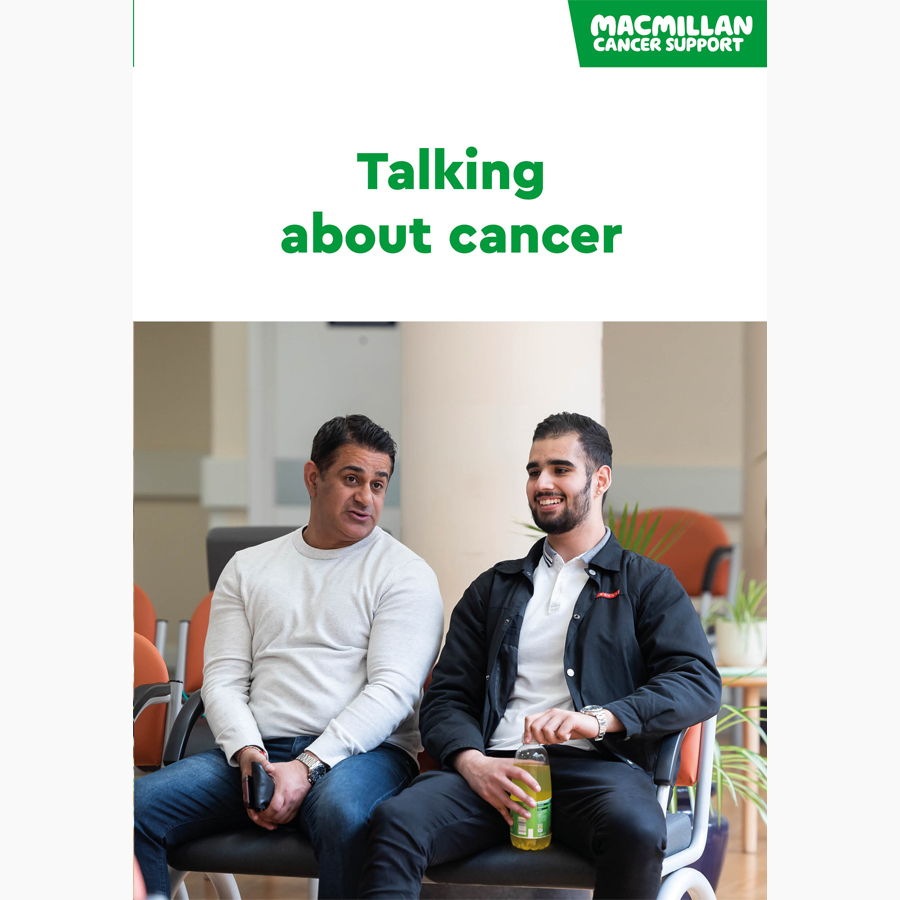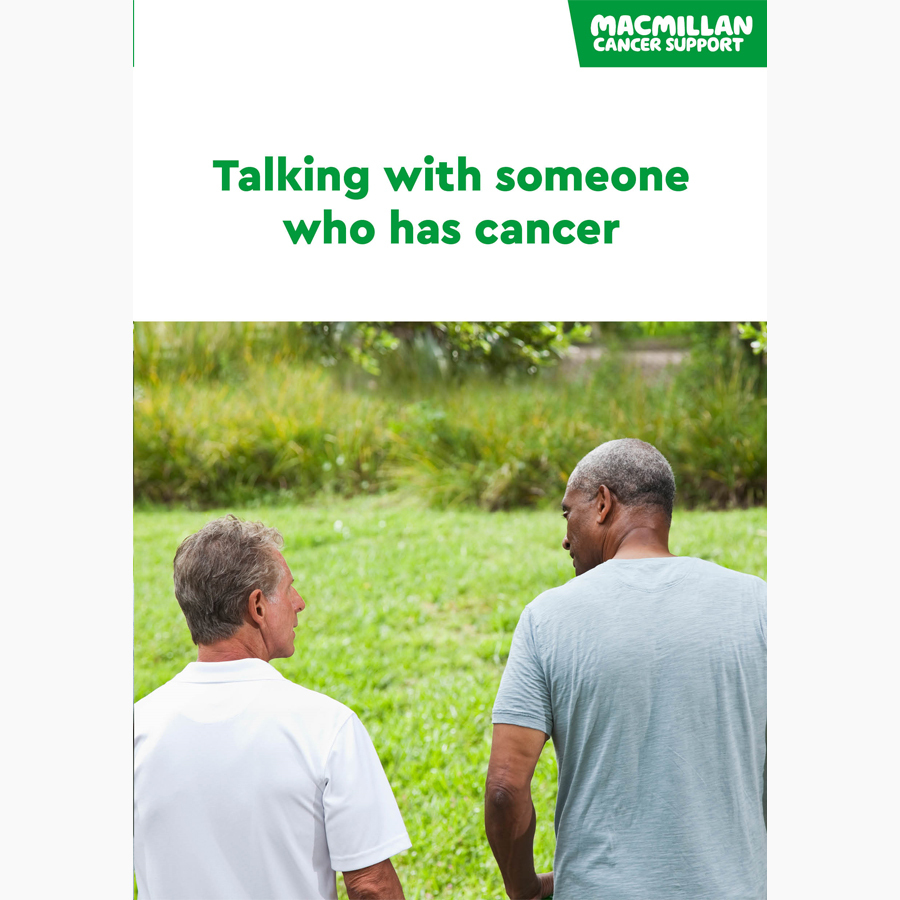Talking, counselling and support groups
Talking about your feelings when you have cancer
Talking about your thoughts and feelings may help you cope with the stress, anxiety and difficult feelings that can happen following a cancer diagnosis. You may find that it helps to talk openly with your family and friends.
The healthcare professionals caring for you and who know your situation can also be a good source of support. They will be able to tell you about other sources of support at the hospital, such as a psychologist or counselling service.
View the video without BSL interpreter on our YouTube Channel.
Related pages
Booklets and resources
What are talking therapies?
Talking therapies involve talking to a trained therapist about your thoughts and feelings. They can help with anxiety and depression.
A therapist may be a counsellor or psychologist. You may meet your therapist regularly. This is usually once a week for several months. Some people continue to see a therapist for years.
All therapy sessions are confidential. This means you can trust your therapist with information that may be personal or embarrassing.
Therapists work with you to understand the difficulties you are facing and suggest different ways you might cope with them. Types of talking therapies include:
- counselling
- cognitive behavioural therapy (CBT)
- psychotherapy.
Different types of therapies may suit different people or problems. You usually have an assessment first to find out more about your needs.
Therapy may be:
- one-to-one or in a group
- online or over the phone
- with your family or partner.
Other types of therapy, such as mindfulness and meditation, involve practising techniques by yourself in your own time.
Your GP or a member of your healthcare team may be able to refer you for NHS talking therapies. Or you can contact the British Association for Counselling and Psychotherapy (BACP) to find information about private therapy.
Self-referral
In England, you can get free talking therapies on the NHS. These are for common mental health problems, such as anxiety or depression. You can contact the service yourself or your GP can refer you. Visit the NHS website for more information.
-
If you live in Scotland
In Scotland, you can call the Living Life service on 0800 328 9655 (Monday to Friday, 1pm to 9pm) to access the Cognitive Behavioural Therapy (CBT) telephone service. They will ask you to provide some details. They will then arrange an assessment appointment to discuss the service and how they can help. Visit the NHS 24 website to find out more.
-
If you live in Wales
In Wales, there is no self-referral scheme. You will need to visit your GP for referral to counselling services through the NHS.
-
If you live in Northern Ireland
In Northern Ireland, you can call Lifeline on 0808 808 8000 to talk to a trained counsellor. They will help you identify the support you need. They can then arrange a face-to-face counselling appointment in your local area. This is usually within 7 days. Visit the Lifeline website for more information.
Waiting times
Not all areas offer the same services, and waiting times can be long. While you wait, it is important to get the support you need. Many organisations offer support.
You may be able to get support on the phone, online, by email or face-to-face through local support groups. If waiting times are long, it might be better to use self-referral while you are waiting.
You can also think about things that helped you cope in the past and use those coping strategies until you are able to access help. It can help to keep a diary or journal of your feelings and moods. If you start to feel worse, talk to your GP, cancer doctor or specialist nurse.
Related pages
What is counselling?
Counselling can help you talk about your feelings. It is a type of talking therapy. At your appointment, you can talk to a trained counsellor, who will listen and support you without judging you.
Counsellors will not usually give advice or tell you what to do. But they can help you:
- cope with changes in your relationships
- think about what is important to you
- deal with practical problems
- find new ways of coping.
Some GPs, hospitals and cancer treatment centres have their own counsellors, or they can refer you to one. If your employer has an employee assistance programme (EAP), you can often contact a counsellor that way. Ask your employer for more information about this. We have more information about talking to your employer about cancer.
Counselling may be free, or you may need to pay for it. This is more likely if you see a counsellor long term.
You can call our support line for free on 0808 808 00 00 for more information about finding a counsellor. Or you can contact the British Association for Counselling and Psychotherapy (BACP).
Local charities and organisations
There are local counselling centres run by charities or counsellor training schools. These may offer support by phone, by email, or face-to-face through local support groups.
You can also search online for low-cost counselling in your area to find an organisation near you.
Suicidal feelings
If you are in crisis or having suicidal feelings, you will not be able to get immediate help using the Bupa service. You can call 999 or Samaritans on the free, 24-hour helpline at 116 123 at any time of the day or night.
Or you can call the Macmillan Support Line for free on 0808 808 00 00 (between 8am and 8pm daily) so they can direct you towards services that can help.
Related pages
What is cognitive behavioural therapy (CBT)?
Cognitive behavioural therapy (CBT) is a talking therapy. It can help you manage your problems better by changing the way you think and behave. It can be used to treat anxiety, panic attacks, depression or other health problems.
The way we think and behave can have a powerful effect on how we feel. People who are anxious or depressed often have unhelpful patterns of thinking and behaviour. These can lead to the problem getting worse. CBT helps you change these negative patterns.
The therapist will help you recognise the negative thoughts and help you find ways to change them. They will also help you find out which things give you a sense of satisfaction and pleasure.
You can ask your cancer doctor, specialist nurse or GP about any local support services that are available to you. You can also search for therapists on the British Association of Behavioural and Cognitive Psychotherapies (BABCP) website.
Related pages
Online services
Online services are available to support people with mental health issues such as anxiety and depression. You can use these on a computer, smartphone or tablet. For some people, this can be just as helpful as face-to-face therapy.
You may be able to use online services for free on the NHS. You can ask your GP or someone in your healthcare team about it. Or you can contact the services yourself. If they are not available on the NHS in your area, you may be able to pay for the services.
Private clinics
Private therapists can often see you straight away. They can be expensive, but many offer lower rates if you are on a low income. Private therapy is useful if you:
- want a certain type of talking therapy
- need quick access to treatment
- want to continue therapy for longer than you can on the NHS.
You can find a private therapist through the British Association for Counselling and Psychotherapy (BACP).
Hospices
Your specialist nurse or hospital doctor may refer you to a hospice for support.
Some hospices can help anyone with cancer or other long-term illnesses. Some can offer psychological support and complementary therapies, such as massage and reflexology, as well as symptom control. The care is free, and it may help you relax and manage your stress better.
You do not always have to stay in the hospice. You can visit for day therapy. This gives you the chance to meet people going through similar experiences. It can also give your family or carers some time for themselves.
Related pages
Self-help and support groups
Many people find it helpful to join a self-help or support group. It can you feel less alone. You can also learn from the experiences of other people and how they have coped with the cancer and its effects on you and your life.
Some groups are for people with a specific type of cancer. For example, there are breast cancer groups and laryngectomy groups. It may help to go along to see what the group is like before you decide to join. You might want to take someone with you.
Each cancer support group is different. Most groups provide training in listening skills for group leaders. This means they will be able to listen in a positive, caring way. Meetings might include an activity, a social event or a talk from a guest speaker.
You may be able to access support services through the group. These might include complementary therapies or counselling.
You can search online for self-help or support groups in your area or by asking someone from your healthcare team. You can also call our cancer support specialists for free on 0808 808 00 00.
Share your experience
Having cancer is a life-changing experience. When treatment finishes, many people find it helps to talk about it and share their thoughts, feelings and advice with other people.
Hearing about how you have coped, what side effects you had and how you managed them may help someone in a similar situation.
To find out more about sharing your experience, call the Supporter Care team on 0300 1000 200.
You can also join our Online Community to connect with people who have been affected by cancer, share your experience, and ask questions. We also have a dedicated emotional support forum on the Online Community.
Date reviewed

Our cancer information meets the PIF TICK quality mark.
This means it is easy to use, up-to-date and based on the latest evidence. Learn more about how we produce our information.





